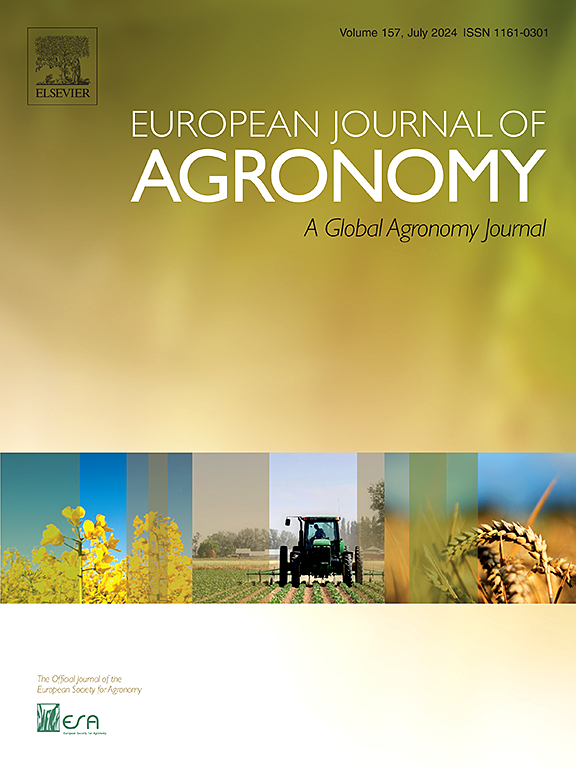土壤与气候的相互作用加深了对作物长期产量稳定性的理解
IF 5.5
1区 农林科学
Q1 AGRONOMY
引用次数: 0
摘要
提高作物产量和稳定性对于主要受气候影响的可持续粮食生产至关重要。养分管理可减轻气候变化对产量稳定性的负面影响,但人们对气候变量(尤其是冠层、土壤和夜间温度)和土壤养分相互作用对产量异常的解释能力知之甚少。本研究评估了华北平原在不同的氮、磷、钾养分供应组合下,小麦和玉米产量及产量异常对各种气候变量的长期(1992-2020 年)响应。结果表明,与未施肥的对照相比,氮磷钾处理提高了小麦和玉米相对产量异常(RYA)的稳定性达65%,但对绝对产量异常(AYA)的稳定性产生了负面影响。养分供应对玉米产量稳定性的影响大于小麦。地温和土壤温度对产量和产量异常的影响最大,而气温的影响较小。完全依赖气候数据的模型分别解释了 34% 和 28% 的小麦 RYA 和 AYA,以及 44% 和 49% 的玉米 RYA 和 AYA。纳入养分与气候的交互作用后,小麦 RYA 模型的解释力提高到 67%,玉米 RYA 模型的解释力提高到 62%。此外,年度随机效应对玉米产量和产量异常的解释作用较小,但对小麦 RYA 的解释作用显著。养分与气候的交互作用大大提高了模型对作物产量异常的解释能力,从而支持了在不断变化的气候条件下的可持续粮食生产战略。本文章由计算机程序翻译,如有差异,请以英文原文为准。
Soil-climate interactions enhance understanding of long-term crop yield stability
Improving crop yield and stability is crucial for sustainable food production, which is predominantly influenced by climate. Nutrient management mitigates the negative impacts of climate change on yield stability, but little is known about the explanatory capability of climate variables (especially canopy, soil, and nighttime temperatures) and soil nutrient interactions for yield anomalies. This study evaluated the long-term (1992–2020) responses of wheat and maize yields and yield anomalies to various climatic variables under distinct combinations of nitrogen (N), phosphorus (P), and potassium (K) nutrient supplies in the North China Plain. Results showed that NPK treatment improved the stability of relative yield anomalies (RYA) for wheat and maize by up to 65 % compared to the unfertilized control, while negatively affecting the stability of absolute yield anomalies (AYA). Nutrient supply affected the yield stability of maize more than that of wheat. Ground and soil temperatures contributed the most to the yield and yield anomalies, while air temperature was less associated. Models relying solely on climate data explained 34 % and 28 % of the wheat RYA and AYA, respectively, and 44 % and 49 % of the maize RYA and AYA, respectively. Incorporating nutrient-climate interactions improved the model explanatory power to 67 % for wheat RYA and to 62 % for maize RYA. Additionally, annual random effects were less critical in explaining maize yield and yield anomalies but significant for wheat RYA. The nutrient-climate interactions greatly improved the explanatory capability of models to crop yield anomalies, thereby supporting strategies for sustainable food production amidst changing climate.
求助全文
通过发布文献求助,成功后即可免费获取论文全文。
去求助
来源期刊

European Journal of Agronomy
农林科学-农艺学
CiteScore
8.30
自引率
7.70%
发文量
187
审稿时长
4.5 months
期刊介绍:
The European Journal of Agronomy, the official journal of the European Society for Agronomy, publishes original research papers reporting experimental and theoretical contributions to field-based agronomy and crop science. The journal will consider research at the field level for agricultural, horticultural and tree crops, that uses comprehensive and explanatory approaches. The EJA covers the following topics:
crop physiology
crop production and management including irrigation, fertilization and soil management
agroclimatology and modelling
plant-soil relationships
crop quality and post-harvest physiology
farming and cropping systems
agroecosystems and the environment
crop-weed interactions and management
organic farming
horticultural crops
papers from the European Society for Agronomy bi-annual meetings
In determining the suitability of submitted articles for publication, particular scrutiny is placed on the degree of novelty and significance of the research and the extent to which it adds to existing knowledge in agronomy.
 求助内容:
求助内容: 应助结果提醒方式:
应助结果提醒方式:


